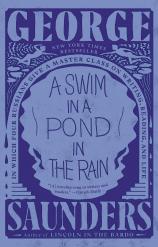A Swim in a Pond in the Rain: In Which Four Russians Give a Master Class on Writing, Reading, and Life
Review
A Swim in a Pond in the Rain: In Which Four Russians Give a Master Class on Writing, Reading, and Life
In 2018, I had the pleasure of attending a reading by George Saunders. He was on tour to promote his Booker Prize-winning novel, LINCOLN IN THE BARDO, at the Midtown Scholar, the wonderful independent bookstore in my hometown of Harrisburg, Pennsylvania. As one would expect from the man who delivered a moving convocation speech that went viral in 2013, in which he revealed that “what I regret most in my life are failures of kindness,” Saunders was erudite, witty, charming and, above all, humane.
Therefore, it came as no surprise to me that Saunders’ A SWIM IN THE POND IN THE RAIN manifests all those same qualities. Based on the class he has taught for 20 years to Syracuse MFA students on the 19th-century Russian story in translation, the book --- a guide for both serious readers and writers --- focuses intensively on seven short stories by four Russian masters: Chekhov, Turgenev, Tolstoy and Gogol. Saunders offers them to support his expansive claim that they “seemed to regard fiction not as something decorative but as a vital moral-ethical tool.”
"While Chekhov, Tolstoy, Turgenev and Gogol provide the raw material, it is Saunders who is graciously and patiently teaching the master class. His lessons will enrich the lives of anyone --- writer, reader or both --- lucky enough to read this marvelous book."
Though he draws on the work of only a handful of authors and admits that his selections don’t even necessarily represent their best work (no “The Lady with the Dog” for Chekhov fans), Saunders deftly extracts meaningful teachings from each of these tales. Above all, he explains how these authors effectively made conscious choices that allowed these “simple, clear, elemental stories” to serve as “seven fastidiously constructed scale models of the world, made for a specific purpose that our time maybe doesn’t fully endorse but that these writers accepted implicitly as the aim of art --- namely, to ask the big questions.”
For Saunders, then, Turgenev’s “The Singers,” the story of an impromptu singing competition in a nondescript rural pub, for all its “technical bumbling” (wordy character descriptions and “digressions inside of digressions”) is nothing short of a profound meditation on art and its power to move us. In Tolstoy’s novella-length “Master and Man,” he interrogates the process of moral transformation arising from the existential crisis faced by a wealthy landowner and his servant battling to survive a snowstorm. Chekhov’s “Gooseberries,” the meaning of which emerges from a conversation in the aftermath of three men taking an afternoon swim, reveals itself as a reflection on happiness. While “fiction doesn’t support polemic very well,” Saunders argues, in the hands of masters like these it often generously delivers profound lessons.
Although Saunders states emphatically that this isn’t a how-to book, any writer --- aspiring or established --- will benefit considerably from his insights. Reading it makes us feel like we’re eavesdropping on an architect describing the complex design of a building, or a veteran football coach diagramming an ingenious play. He explains his own process of revision --- “a repetitive, obsessive, iterative application of preference” --- and modestly describes the transformation that occurred in his own work when he abandoned the effort to summit “Hemingway Mountain” and “stumbled back down into the valley and came upon a little shit-hill labeled ‘Saunders Mountain.’” The four distinctive short-story collections and novel that resulted from that discovery provide powerful evidence to support his plea for authenticity and a sensitivity to the way stories proceed painstakingly --- sentence by sentence, toward meaning, as the writer must strive relentlessly to answer a central question: “What makes a reader keep reading?”
Above all, Saunders is intent on teaching all of us how to be better readers, more thoughtful and receptive to the true magic these genius writers are producing on the page. He’s wary of making any grandiose claims for the value of reading fiction, even works as great as these, warning that we “shouldn’t overestimate or unduly glorify what fiction does.” But even the humble ones he advances for it --- that it “causes an incremental change in the state of the mind,” for example --- seem like they’re more than enough. That’s especially so at a time when many of us are searching for tools that might help us become more empathetic toward each other. “This whole process of reading and writing, and that holy process of two people talking about a story together… I think it makes everyone’s life better,” he observed in a recent interview in Esquire. When that happens, it’s no small accomplishment.
If you’re an avid reader, especially of short stories, after reading A SWIM IN A POND IN THE RAIN it’s unlikely you’ll ever approach one again without hearing George Saunders’ warm, encouraging, wise voice in your head. He is far too self-effacing in the book’s subtitle. While Chekhov, Tolstoy, Turgenev and Gogol provide the raw material, it is Saunders who is graciously and patiently teaching the master class. His lessons will enrich the lives of anyone --- writer, reader or both --- lucky enough to read this marvelous book.
Reviewed by Harvey Freedenberg on January 15, 2021
A Swim in a Pond in the Rain: In Which Four Russians Give a Master Class on Writing, Reading, and Life
- Publication Date: April 12, 2022
- Genres: Essays, Literary Criticism, Nonfiction
- Paperback: 432 pages
- Publisher: Random House Trade Paperbacks
- ISBN-10: 1984856030
- ISBN-13: 9781984856036




